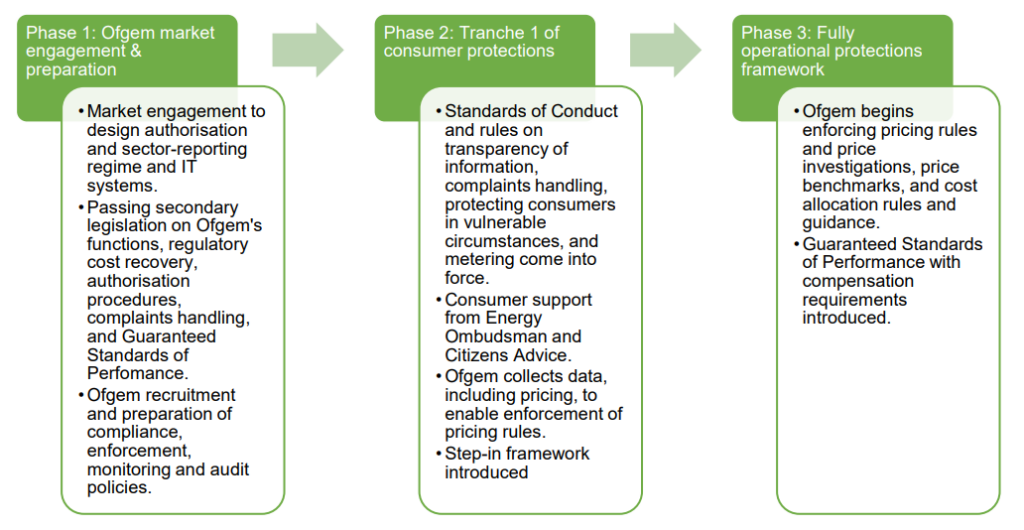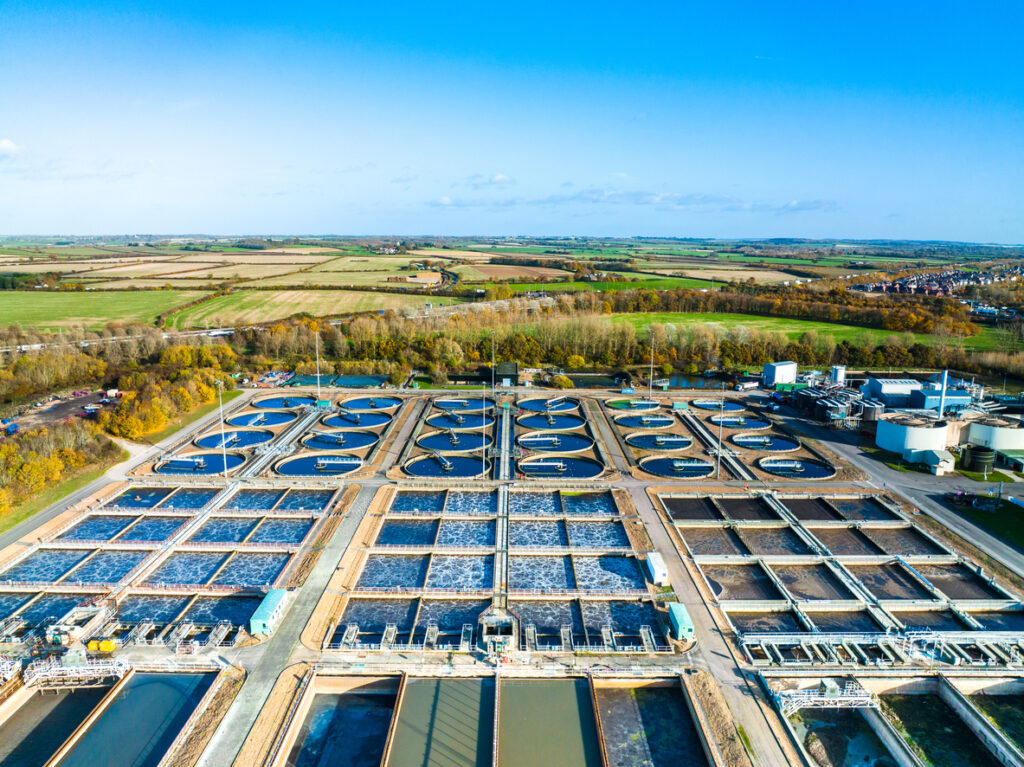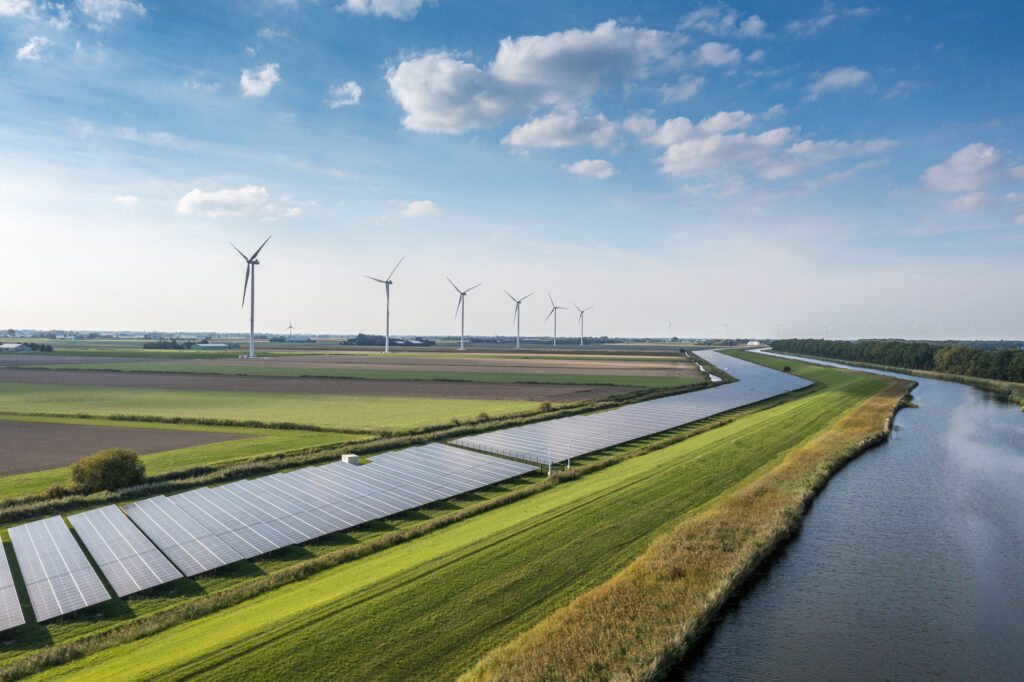In August 2023, the Department of Energy Security and Net Zero (DESNZ) and Ofgem published a joint consultation on consumer protection for heat networks. The consultation sought views on consumer protection requirements such as pricing, quality of service, transparency of information and consumers in vulnerable circumstances, and, how Ofgem should implement and enforce regulation.
In April 2024, the Government published its responses to the consultation and an overview of its policy proposals for consumer protection.
We highlight the key takeaways you need to know below.
Consumer protection and the measures for enforcing it would be scaled up in three phases, outlined below

Heat Networks falling within the scope of regulation
Communal and district heat networks are defined in the Energy Act 2023:
Heat network
A network that, by distributing a liquid or a gas, enables the transfer of thermal energy to supply heating, cooling or hot water to a building or persons in that building (and includes any appliance the main purpose of which is to heat or cool the liquid or gas) (s. 216 Energy Act 2023);
Communal heat network
A heat network by means of which heating, cooling or hot water is supplied only to a single building divided into separate premises or persons in those premises (s. 216 Energy Act 2023); and
District heat network
A heat network by means of which heating, cooling or hot water is supplied to two or more buildings or persons in those buildings (s.216 Energy Act 2023).
Ofgem will not expand the definition of communal heat network to include networks of multiple communal buildings within a single site – instead, these will be classed as a district heat network.
In the future, greater obligations may be proposed for district networks over communal networks. However, Ofgem will consider the appropriateness of applying greater obligations to single site district networks managed by a single entity.
Communal and district networks with connections to domestic consumers and microbusinesses (i.e. consumes less than 247,000kWh of heat per year, less than 10 full-time employees, or annual turnover of less than 2 million EURO) must meet consumer protection measures as well as metering, technical standards, decarbonisation (from 2025), general authorisation, monitoring, compliance and audit requirements. Small networks will be able to comply with regulation in a proportionate and cost-effective ways provided outcomes for consumers are met.
Heat networks that include a shared ground loop will be included in the scope of regulation – but consumer protection measures, authorisation, monitoring, and compliance requirements will be relevant to this technology type.
Houses of Multiple Occupations (HMOs) that include a shared heating system but are not divided into “separate premises” will not meet the definition of a communal heat network as they share either a bathroom, toilet or cooking facilities and fall outside the scope of regulation.
Single buildings with shared heating systems which are not divided into separate premises e.g. nursing homes or student accommodation with shared facilities, will also fall outside the scope of regulation. Although if these buildings are supplied by a district heat network, that network will still need to be authorised.
Entities operating and supplying through heat networks to exclusively industrial customers will need to be authorised –these entities will be outside the decarbonisation requirements and wider consumer protection standards, but there will be further consultation in the summer as to whether minimum technical standards should be applied to industrial heat networks.
Lastly, self –supply heat networks (e.g. hospitals, prisons, university buildings, and any heat network where a single entity pays for heating on behalf of consumers) will be subject to carbon emissions and technical standards requirements and so will need to hold an authorisation.
If the same entity operates an industrial heat network that heats ancillary spaces such as offices, warehouses, and staff areas which such entity occupies, this will be considered self-supply. We expect further consultation as to whether there ought to be minimum technical standards for these in the summer.
Ofgem is also considering whether the scope of regulation should include heat networks serving small and medium sized enterprises.
Authorisation Regime
DESNZ and Ofgem will consult on the authorisation application process and authorisation conditions in summer 2024. At present existing networks would automatically become authorised and new networks would need to apply for authorisation.
Persons undertaking regulated activities in the heat sector (e.g. operation of communal and heat networks, supply of heating, cooling, or hot water to customers through a heat network) will require authorisation to do so.
Ofgem will refine definitions for separate regulated activities of “operator of heat network” and “heat network supplier.” Currently, in most cases, this is undertaken by the same entity, but Ofgem want to retain the ability to allow for potential specialisation within the industry in the future.
Ofgem will provide guidance on who will be considered as the “operator” of a heat network (an entity that has significant control over heat network assets, the ability to invest in the network and make decisions on repairs and maintenance). They will also consider who is a “heat supplier” (the person who has the heat supply contract with the customer and is able to set the terms of such contract). Subcontracting to an operations and maintenance contractor or a billing and metering agent will not delegate regulatory responsibility.
Authorisation Conditions
Authorisation conditions will define the roles of both operator and supplier. If a network heat source or energy centre is operated independently of the rest of a heat network, or the heat source is a separate legal entity to the heat network operator, and does not meet the definition of heat operator or heat supplier, the heat source owner will not be a regulated entity. While the heat operator will report to Ofgem on heat sources supplying heat to a heat network, it will not be regulated.
Heat network operators will need to ensure that there are sufficient contractual protections with third party owned heat sources so as to ensure it can comply with its obligations, such as providing continuous heat supply to customers.
Authorisation conditions will require heat networks to be open and co-operative with the regulator and will also cover financial responsibility by suppliers/operators, control over material assets and the ability to transfer key physical and contractual assets, and operational capability to serve consumers and comply with regulatory obligations. Furthermore there will be development of policy on monitoring so that Ofgem can assess compliance with regulation as well as policy on when regulatory audits will be conducted, when Ofgem will enforce consumer protection regulation and what financial penalties Ofgem will impose for non-compliance.
Pricing
There is a general obligation to provide fair and transparent prices. Ofgem’s rules and guidance will set out the minimum expectations, principles and good practice on fair pricing. There will also be an authorisation condition on operators and suppliers to provide fair and transparent prices.
There will be a quarterly reporting of pricing data by operators and suppliers. Ofgem is considering how price data for heat networks will be published: group according to heat networks with similar characteristics, or group prices according to market average and comparison to gas and low carbon alternatives; with a RAG (Red, Amber,Green) rating to indicate how suppliers are performing.
Ofgem is also considering whether prices should be compared against a counterfactual (gas boiler or heat pump), whether prices on similar networks should be compared with each other or whether the heat operator/supplier should compare prices against its own past prices to detect if there are any significant deviations that are not explained by input cost fluctuations.
Ofgem has decided not to introduce price caps in the near term but has said that this will be kept under review.
Ofgem is also developing policy on billing in relation to heat supply agreements for unmetered properties where heat charges are bundled with rent etc.
Further consultation on pricing is expected this autumn.
Standards
There will be a possible introduction of “security of supply” concept to standards of conduct so as to ensure reliability of heat networks.
The definition of vulnerable customer (going beyond the Heat Trust definition) is to be formulated and consideration of disconnection ban for vulnerable customers.
There is to be consideration of a step-in framework to protect consumers e.g. if their supplier goes out of business – requiring operators (and possibly suppliers) to identify a contractual step-in party.
Heat suppliers will be obliged to operate a priority services register and provide specific services for consumers who need them- and Ofgem will explore how this data can be shared with other utilities.
Guidance is to be formulated on: complaint handling, guaranteed standards of performance, customer supply continuity plans, priority services register requirements and billing practices and templates.
Metering
Currently, heat suppliers with unmetered networks must install meters unless it is not cost effective or technically feasible to do so. Ofgem will remove this “open class” obligation and will, instead, define instances where meters should not be installed. Ofgem will also make proposals on the installation of meters in communal areas.
Next Steps
The Government aims to commence heat zoning in England in 2025. We can expect to see a consultation on the authorisation application process and authorisation conditions, technical standards, metering, step in arrangements and consumer protection measures (vulnerability, complaints, guaranteed standards of performance, billing, and price protection) by summer 2024. This will be followed by a consultation on price protection, fair pricing policy, and an identification of what is disproportionate pricing by autumn 2024.






